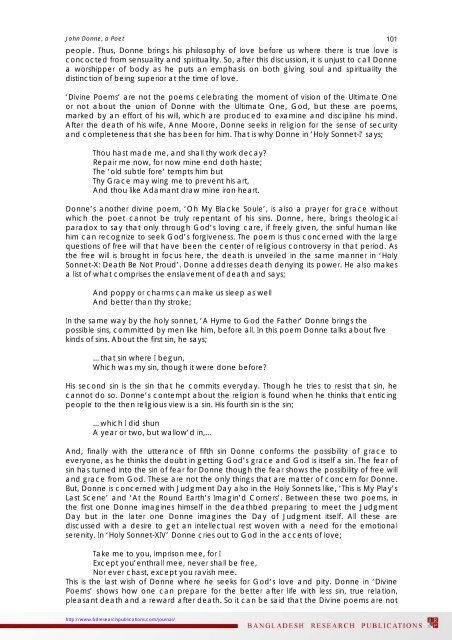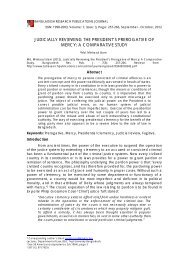John Donne, a Poetpeople. Thus, Donne brings his philosophy <strong>of</strong> love before us where there is true love isconcocted from <strong>sensuality</strong> and <strong>spirituality</strong>. So, after this discussion, it is unjust to call Donnea worshipper <strong>of</strong> body as he puts an emphasis on both giving soul and <strong>spirituality</strong> thedistinction <strong>of</strong> being superior at the time <strong>of</strong> love.‘Divine Poems’ are not the poems celebrating the moment <strong>of</strong> vision <strong>of</strong> the Ultimate Oneor not about the union <strong>of</strong> Donne with the Ultimate One, God, but these are poems,marked by an effort <strong>of</strong> his will, which are produced to examine and discipline his mind.After the death <strong>of</strong> his wife, Anne Moore, Donne seeks in religion for the sense <strong>of</strong> securityand completeness that she has been for him. That is why Donne in ‘Holy Sonnet-I’ says;Thou hast made me, and shall thy work decay?Repair me now, for now mine end doth haste;The ‘old subtle fore’ tempts him butThy Grace may wing me to prevent his art,And thou like Adamant draw mine iron heart.Donne’s another divine poem, ‘Oh My Blacke Soule’, is also a prayer for grace withoutwhich the <strong>poet</strong> cannot be truly repentant <strong>of</strong> his sins. Donne, here, brings theologicalparadox to say that only through God’s loving care, if freely given, the sinful human likehim can recognize to seek God’s forgiveness. The poem is thus concerned with the largequestions <strong>of</strong> free will that have been the center <strong>of</strong> religious controversy in that period. Asthe free will is brought in focus here, the death is unveiled in the same manner in ‘HolySonnet-X: Death Be Not Proud’. Donne addresses death denying its power. He also makesa list <strong>of</strong> what comprises the enslavement <strong>of</strong> death and says;And poppy or charms can make us sleep as wellAnd better <strong>than</strong> thy stroke;In the same way by the holy sonnet, ‘A Hyme to God the Father’ Donne brings thepossible sins, committed by men like him, before all. In this poem Donne talks about fivekinds <strong>of</strong> sins. About the first sin, he says;…that sin where I begun,Which was my sin, though it were done before?His second sin is the sin that he commits everyday. Though he tries to resist that sin, hecannot do so. Donne’s contempt about the religion is found when he thinks that enticingpeople to the then religious view is a sin. His fourth sin is the sin;…which I did shunA year or two, but wallow’d in,…And, finally with the utterance <strong>of</strong> fifth sin Donne conforms the possibility <strong>of</strong> grace toeveryone, as he thinks the doubt in getting God’s grace and God is itself a sin. The fear <strong>of</strong>sin has turned into the sin <strong>of</strong> fear for Donne though the fear shows the possibility <strong>of</strong> free willand grace from God. These are not the only things that are matter <strong>of</strong> concern for Donne.But, Donne is concerned with Judgment Day also in the Holy Sonnets like, ‘This is My Play’sLast Scene’ and ‘At the Round Earth’s Imagin’d Corners’. Between these two poems, inthe first one Donne imagines himself in the deathbed preparing to meet the JudgmentDay but in the later one Donne imagines the Day <strong>of</strong> Judgment itself. All these arediscussed with a desire to get an intellectual rest woven with a need for the emotionalserenity. In ‘Holy Sonnet-XIV’ Donne cries out to God in the accents <strong>of</strong> love;Take me to you, imprison mee, for IExcept you’enthrall mee, never shall be free,Nor ever chast, except you ravish mee.This is the last wish <strong>of</strong> Donne where he seeks for God’s love and pity. Donne in ‘DivinePoems’ shows how one can prepare for the better after life with less sin, true relation,pleasant death and a reward after death. So it can be said that the Divine poems are not101http://www.bdresearchpublications.com/journal/
Dipak Kumar Sarkara good example to accuse Donne for <strong>sensuality</strong>, rather, these poems are his greatcreation for bringing discipline and sense <strong>of</strong> morality to all.John Donne in his <strong>poet</strong>ry sets before all an ideal to discuss or analyze which finally helps t<strong>of</strong>ind out what is the best for all though the spirit <strong>of</strong> the then writers has been a differentone. The first initiation comes from the scientists who try to establish that the earth and theother planets revolve in orbit around the sun. This has been an attempt to displace manfrom the center <strong>of</strong> creation both literary and metaphorically. As a result the new thoughtcomes in conflict with the traditional teaching <strong>of</strong> the church. Though the old theory seesthe sight <strong>of</strong> victory for a time being, it fails with the emergence <strong>of</strong> the great scientist,Galileo Galilei (1564-1642). Donne in this regard says that ‘new philosophy calls all indoubt’. The second step comes from the writings <strong>of</strong> Niccolo Machiavelli (1469-1527),which introduces science presently known as political science. Machiavelli simply ignoresthe fanciful topics, used by medieval theorists, as he tries to analyze the real nature <strong>of</strong>power in the states. As a step he produces ‘The Prince’ in 1513 which deals with the waysby which political power can be won and held without regard to the question <strong>of</strong> divinepurpose. In chapter-15 he explains clearly that his intension is to present things as theyreally are in fact. It is this scientific spirit that Francis Bacon applauds when he writes, in1623, that we all are indebted to Machiavelli and other writers <strong>of</strong> that class who openlyand unfeignedly describe what men do and not what men ought to do. Bacon arguesthat soundly based scientific knowledge will lead to technical mastery over the world <strong>of</strong>nature. Many <strong>of</strong> his contemporaries have been less optimistic about his new thought andhave been anxious about the change. The fullest expression <strong>of</strong> this can be found in manydramatists <strong>of</strong> that time. William Shakespeare, in particular, has been preoccupied with asense <strong>of</strong> discrepancy between what men do and what they ought to do’. In ‘Troilus andCressida’ Shakespeare provides a pr<strong>of</strong>ound illustration <strong>of</strong> this new skepticism. Donne doesnot <strong>of</strong>fer any new skepticism but he takes the reader to that situation with his brilliantpower <strong>of</strong> imagery to discover the truth and the right one with the taste <strong>of</strong> reality. In ‘TheApparition’ Donne creates a situation by means <strong>of</strong> imagery where a lover threatens tohave revenge as the beloved has rejected him. Here, Donne takes the readers to thebeloved’s room where he, in future though, is going to be present as a ghost. And, therethe beloved has been seen sleeping in the arms <strong>of</strong> another man. Donne says;Then shall my ghost come to your bed,And thee, feign’d vestal, in worse arms shall see;This lady who has rejected the lover on the issue <strong>of</strong> losing virginity, is found having pleasure<strong>of</strong> adultery. So, the stage is set, and the drama is played. Now it is the turn <strong>of</strong> the readersto decide which the right one is. But, at last Donne takes the lover back keeping theemotion and thought in readers’ mind saying;I had rather thou shouldst painfully repent,Than by my threatenings rest still innocent.It is the desire <strong>of</strong> Donne in ‘The Flea” too where he sets a dramatic situation <strong>of</strong> a saucylover appealing for sexual pleasure too his beloved who rejects him. In ‘ A Hymn to GodThe Father’ Donne by the discussion on sins shows the options, which are to follow, andwhich are to be avoided. Sincerity <strong>of</strong> <strong>poet</strong>’s feeling can be found in ‘Oh My Blacke Soule’which shows <strong>poet</strong>’s agony and sense <strong>of</strong> guilt with his willingness to pray for the debt <strong>of</strong> sinsthrough repentance and suffering. It is a struggle to make a truth appropriate, which doesnot defeat all <strong>poet</strong>ry but gives us a <strong>poet</strong>ry whose intensity is a moral one. Moreover inpoems like, ‘The Anniversary’, ‘A Valediction: Forbidden Mourning’, ‘The Extasie’ and soon the main character is Donne and thus he makes experiment on himself. Donne onlyshares the options or the outcomes that are to be or can be followed. Donne does notplay the role <strong>of</strong> a school teacher to lead the innocent school students to the right path byadvice or punishment, rather, he discusses all the sides <strong>of</strong> a coin and brings the real coinbefore the audience who themselves can choose the right one. In this way, Donne wishesthe active participation <strong>of</strong> the audience, as the audiences are to decide and take theright way to uphold the morality.It is not that the sexual or bodily apprehensions are totally absent in Donne but the desireto uphold the morality or <strong>spirituality</strong> dominates him <strong>more</strong>. The discovery <strong>of</strong> right andperfect relationship between men and women, soul and God are crucial steps in the102http://www.bdresearchpublications.com/journal/
















